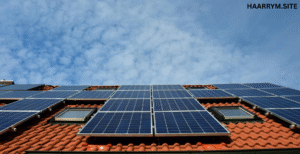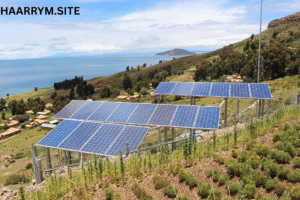
Many homes and companies are seeking solar electricity as a sustainable and reasonably priced alternative as the demand for renewable energy skyrockets. Jinko Solar is among the most well-known and biggest brands among the sea of solar panel producers. Are Jinko solar panels, however, really worth the money? In this extensive Jinko solar panel review, we will thoroughly explore their efficiency, performance, cost, warranties, and overall value to help you make an informed decision in 2025.
Introduction to Jinko Solar5.
Based in Shanghai, China, Jinko Solar Holding Co., LTD is a worldwide solar panel producer. Established in 2006, Jinko has expanded quickly and now boasts a Fortune 500 ranking with manufacturing sites all across China, Malaysia, and the United States.
BloombergNEF notes that the firm consistently ranks among the top Tier 1 manufacturers and is well-known for its solar technological inventiveness. Over 160 nations have Jinko Solar panels running millions of homes, businesses, and solar farms.
What Makes Jinko Solar Panels Stand Out?
Before we get into the nitty-gritty of specs and reviews, let’s highlight what makes Jinko unique in the crowded solar market:
-
Tier 1 Manufacturer Status: This indicates strong financial stability and large-scale production.
-
Global Reach: Jinko is one of the most bankable solar brands worldwide.
-
Advanced Technology: Including bifacial, N-type, and high-efficiency monocrystalline panels.
-
Eco-Friendly Manufacturing: With a focus on sustainability, Jinko is a member of RE100, committed to 100% renewable energy.
Jinko Solar Panel Models (2025)
Jinko offers a range of solar panels suited for residential, commercial, and utility-scale applications. The most notable models in 2025 include:
1. Jinko Tiger Neo Series (N-Type TOPCon Technology)
-
Efficiency: Up to 22.3%
-
Power Output: 430W – 635W
-
Temperature Coefficient: -0.30% / °C
-
Highlight: Exceptional low-light performance and reduced degradation.
2. Jinko Cheetah Series
-
Efficiency: 20.3% – 21.1%
-
Power Output: 330W – 410W
-
Technology: PERC monocrystalline
-
Highlight: Affordable and ideal for residential rooftops.
3. Jinko Tiger Pro Series
-
Efficiency: Up to 21.6%
-
Power Output: 500W – 600W
-
Design: Larger module size for commercial and utility-scale projects.
-
Highlight: Excellent LCOE (Levelized Cost of Energy) and ROI.
Performance & Efficiency: How Do They Compare?
When comparing Jinko panels to other top brands like LG, REC, or SunPower, they hold their own quite well, especially in terms of:
✅ Efficiency
Jinko’s N-Type Tiger Neo panels boast efficiency ratings up to 22.3%, putting them on par with premium models from SunPower and REC. This means more electricity from the same roof space.
✅ Durability
Jinko panels are built with anti-PID technology, robust frames, and high snow and wind load ratings (up to 5400 Pa snow load and 2400 Pa wind). They are certified to withstand harsh environments, making them ideal for diverse climates.
✅ Degradation Rate
Thanks to advanced cell technologies like TOPCon, the Jinko Tiger Neo panels degrade slower than traditional panels—only about 0.4% per year after the first year.
Warranty and Support
Product Warranty:
-
Tiger Neo Series: 15 to 25 years
-
Cheetah Series: 12 years
Performance Warranty:
-
Guarantees at least 87.4% output after 30 years for N-Type models.
Customer Support:
While Jinko’s U.S. customer support is still developing, their reputation globally is strong, with solid after-sales service in regions like Australia and Europe.
Real-World Performance: Customer Reviews and Installer Feedback
⭐ Customer Satisfaction
Most homeowners report high levels of satisfaction with Jinko panels, praising:
-
Reliable performance
-
Competitive pricing
-
Clean aesthetics (especially the all-black options)
👷 Installer Feedback
Solar professionals often recommend Jinko for:
-
Ease of installation
-
High availability and quick shipping
-
Good compatibility with various inverters and racking systems
📉 Any Downsides?
While Jinko offers great value, some common concerns include:
-
Limited premium options for those seeking ultra-high efficiency like SunPower.
-
Brand perception: Some buyers still prefer “Western” brands despite Jinko’s quality.
Cost of Jinko Solar Panels (2025 Estimates)
One of the biggest advantages of Jinko solar panels is affordability. They strike an excellent balance between price and performance.
| Series | Price per Watt (USD) | Installed Cost (6kW System) |
|---|---|---|
| Cheetah Series | $0.50 – $0.65 | $8,000 – $10,000 |
| Tiger Pro Series | $0.60 – $0.75 | $9,500 – $11,500 |
| Tiger Neo Series | $0.70 – $0.90 | $10,500 – $12,500 |
Note: These are estimated prices before incentives like the federal solar tax credit (ITC).
Jinko vs Competitors: How It Stacks Up
| Brand | Max Efficiency | Warranty (Product) | Country of Origin | Cost Range ($/W) |
|---|---|---|---|---|
| Jinko | 22.3% | 15–25 years | China/Global | $0.50 – $0.90 |
| SunPower | 22.8% | 25 years | USA | $1.00 – $1.35 |
| REC | 22.3% | 25 years | Norway/Singapore | $0.85 – $1.20 |
| Trina Solar | 21.7% | 12–25 years | China | $0.55 – $0.85 |
| Q Cells | 21.4% | 25 years | South Korea/Germany | $0.65 – $0.95 |
Jinko shines in the value-for-money segment and competes closely with Trina Solar and Q Cells, offering near-premium efficiency at mid-range prices.
Sustainability and Certifications
Jinko Solar is a leader in environmental responsibility. Notable initiatives include:
-
RE100 Member: Committed to using 100% renewable energy by 2025.
-
ISO Certifications: Certified for environmental, quality, and occupational health standards.
-
Green Supply Chain: Reduced CO2 emissions and water consumption in manufacturing.
Their panels are also certified by international agencies like TÜV Rheinland and UL for safety and quality.
Pros and Cons Summary
✅ Pros:
-
High efficiency and low degradation
-
Broad product range
-
Affordable pricing
-
Durable and reliable
-
Strong international presence
-
Eco-conscious manufacturing
❌ Cons:
-
Limited brand prestige in premium markets
-
U.S. customer service still growing
-
Fewer smart panel options (compared to Enphase-integrated systems)
Is Jinko Right for You?
Jinko is a suitable candidate if you search for solar panels with outstanding performance at a reasonable cost. Without breaking the budget, their sophisticated models—such as the Tiger Neo—offer some of the best efficiency ratings in the business.
Jinko will be much appreciated by homeowners looking for long-term dependability and installers looking for bankable, well-supported panels.
But if you’re looking for the best in terms of design, clever features, or U.S.-based customer service, you might choose to investigate companies like SunPower or Tesla.
Final Verdict: Jinko Solar Panels Review Summary
Jinko Solar has been among the world leaders in solar panel production. Innovations in N-type technology, environmental leadership, and worldwide dependability provide a convincing option for anybody hoping to go solar in 2025.
Jinko solar panels provide consistent performance, long-term savings, and peace of mind whether your project is a commercial solar array investment, new house construction, or energy system upgrade.
SEO Tips for Promoting This Content
To rank well for the keyword “Jinko Solar Panels Review,” use these strategies:
-
Include related long-tail keywords: “Jinko solar review 2025”, “Are Jinko solar panels any good?”, “Jinko vs SunPower”, “Best solar panels 2025”
-
Add internal links to related articles (e.g., “Best Solar Inverters for Jinko Panels”)
-
Use schema markup for reviews and ratings
-
Encourage user-generated reviews or comments on your page
-
Optimize images with descriptive alt text like “Jinko Tiger Neo panel efficiency chart”
Google Ads Text Suggestions
Headline 1: Top-Rated Jinko Solar Panels
Headline 2: High-Efficiency, Low Cost
Headline 3: Trusted in 160+ Countries
Description: Discover why Jinko solar panels are a global favorite. High efficiency, great pricing, and long-term durability. Get a free quote now!
